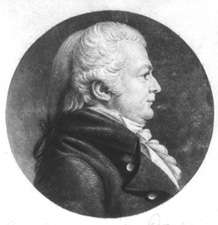Samuel W. Dana
| Samuel Whittlesey Dana | |
|---|---|
 1806 engraving by Charles Balthazar Julien Févret de Saint-Mémin. | |
| United States Senator from Connecticut | |
|
In office December 4, 1810 – March 4, 1821 | |
| Preceded by | James Hillhouse |
| Succeeded by | Elijah Boardman |
| Member of the U.S. House of Representatives from Connecticut's At-Large district | |
|
In office January 3, 1797 – May 10, 1810 | |
| Preceded by | Uriah Tracy |
| Succeeded by | Ebenezer Huntington |
| Personal details | |
| Born |
February 13, 1760 Wallingford, Connecticut |
| Died |
July 21, 1830 (aged 70) Middletown, Connecticut |
| Political party | Federalist |
Samuel Whittlesey Dana (February 13, 1760 – July 21, 1830) was an American lawyer and politician from Middletown, Connecticut. He represented Connecticut in both the U.S. House of Representatives and Senate.
Biography
Born in Wallingford, Connecticut, Dana graduated from Yale College in 1775. He studied law; was admitted to the bar in 1778, and practiced in Middletown, Connecticut.[1]
Family
His father was the clergyman James Dana (1735-1812), who was a nephew of Richard Dana (1699-1772), a lawyer, who was in turn a descendant through Caleb, second son of Daniel, who was the youngest son of Richard Dana, who came from England, settled in Cambridge in 1640, and died there about 1695. According to the family tradition, this last Richard was the son of a French Huguenot that settled in England in 1629.
Career
Dana was a member of the Connecticut General Assembly from 1789 to 1796. Afterward he was elected to the United States House of Representatives to fill the vacancy caused by the resignation of Uriah Tracy, and served from January 3, 1797 to May 10, 1810.[2] There he was chairman of the U.S. House Committee on Elections, and was one of the managers appointed by the House of Representatives in 1798 to conduct the impeachment proceedings against William Blount, a Senator from Tennessee.
Dana was elected as a Federalist in 1810 to the United States Senate to fill the vacancy caused by the resignation of James Hillhouse. He was reelected in 1814 and served from December 4, 1810, to March 3, 1821.[3] He was one of the 13 Senators who voted against war with Britain on June 17, 1812, but 19 Senators voted for war. In 1814, Dana was elected a member of the American Antiquarian Society.[4]
Dana was mayor of Middletown from 1822 until his death in 1830. He was also the presiding judge of the Middlesex County Court from 1825 until his death.[5]
Death
Dana died in Middletown, Middlesex County, Connecticut, July 21, 1830 (age 70 years, 158 days). He is interred at Washington Street Cemetery, Middletown.[6]
References
- ↑ "Samuel W. Dana". Biographical Directory of the United States Congress. Retrieved 29 December 2012.
- ↑ "Samuel W. Dana". The Political Graveyard. Retrieved 29 December 2012.
- ↑ "Samuel W. Dana". Govtrack US Congress. Retrieved 29 December 2012.
- ↑ American Antiquarian Society Members Directory
- ↑ "Samuel W. Dana". Biographical Directory of the United States Congress. Retrieved 29 December 2012.
- ↑ "Samuel W. Dana". Find A Grave. Retrieved 29 December 2012.
External links
| Wikimedia Commons has media related to Samuel W. Dana. |
- Samuel W. Dana at the Biographical Directory of the United States Congress
- American National Biography
- Dictionary of American Biography
- Dana, Samuel Whittlesey [presumed author]. A Specimen of Republican Institutions. Philadelphia: James Humphreys, 1802.
-
 "Dana, James". Appletons' Cyclopædia of American Biography. 1900.
"Dana, James". Appletons' Cyclopædia of American Biography. 1900. -
 "Dana, Richard". Appletons' Cyclopædia of American Biography. 1900.
"Dana, Richard". Appletons' Cyclopædia of American Biography. 1900. -
 "Dana, Joseph". Appletons' Cyclopædia of American Biography. 1900.
"Dana, Joseph". Appletons' Cyclopædia of American Biography. 1900. - Find A Grave
- Govtrack US Congress
| United States House of Representatives | ||
|---|---|---|
| Preceded by Uriah Tracy |
Member of the U.S. House of Representatives from Connecticut's at-large congressional district January 3, 1797 – May 10, 1810 |
Succeeded by Ebenezer Huntington |
| United States Senate | ||
| Preceded by James Hillhouse |
U.S. Senator (Class 1) from Connecticut December 4, 1810 – March 3, 1821 |
Succeeded by Elijah Boardman |
| ||||||||||||
|
